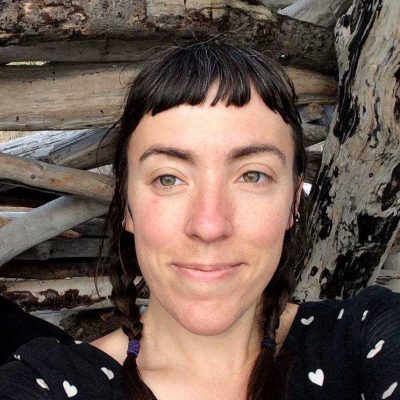Student Spotlight: Claire Fox

November 26, 2018
Claire Fox is a doctoral student in evolutionary biology from Charlottesville, Virginia. Having learned about Cornell’s ecology and evolutionary biology program, she attended Cornell as an undergrad before continuing on to a Ph.D. program.
What is your area of research and why is it important?
I am a functional morphologist and I study how features of organisms work mechanically and physically. Because there is such incredible diversity in the structure of vertebrate bodies, my investigations are anchored in evolutionary history. Study of animal forms inspires biomimetic inventions, such as suction cups based on clingfishes’ fins that can attach to rough and irregular surfaces. My work showed that flatfishes use their fins to walk on the bottom in unique ways that are potentially relevant to the design of autonomous vehicles. My work also contributes to a centuries-long evolutionary debate on the viability of transitional forms.
What inspired you to choose this field of study?
I spent my early childhood running around woods and ponds, often with net in hand, observing and studying whatever I could catch! David Attenborough’s nature programs on PBS were my first contact with science, and a huge influence. The Vertebrates (BIOEE 2740) course at Cornell with Willy Bemis and Betty McGuire opened my eyes to the astonishing diversity of fishes and the fascination of functional morphology. I joined Bemis lab and started working on benthic locomotion in fishes – a research topic inspired partly by our unusual lab pet, John Kamongo (a very charismatic lungfish!).
How did you become involved with the National Geographic article?
My recent work on flatfish benthic walking, published in the journal Zoology, caught the eye of a freelance science writer. National Geographic was a great match for this topic because animal locomotion comes across very well in a video format. I was an avid reader of National Geographic as a child and am thrilled that my research was featured. Understanding and sharing the wonder of animal diversity with the broader world is of critical importance, for as Jacques Cousteau paraphrased, “We only conserve what we love.”
What are your hobbies or interests outside of your research or scholarship?
My passion outside of research is K-12 science engagement. I co-direct Free Science, a nonprofit affiliated with the Community Science Workshop movement in CA. Our free afterschool program feeds the curiosity and builds the confidence of underserved and underrepresented youth in our community. At our unique workshop space kids can hold and care for animals, tinker with old machines, create their own inventions, ask questions, get messy, learn because they want to, and broadly exercise their curiosity about the world through science.
Why did you choose Cornell to pursue your degree?
I chose Cornell for its top-rated Ecology and Evolutionary Biology program, with a reputation for encouraging graduate students to pursue their own research topics and collaborate across disciplines. Also, my husband and I have found Ithaca, NY to be a great place for raising our two boys.
What is next for you?
With a Ph.D. and 15 years of experience in informal science education, there are a lot of exciting ways that I can continue serving my community and the larger world. Life is an adventure – you never know where it will take you!
